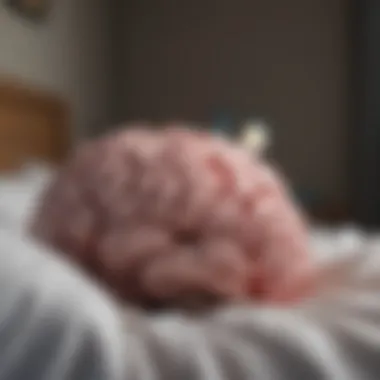Understanding Sleep's Impact on Mental Health


Intro
The relationship between sleep and mental health is complex and significant. Research indicates that the quality and quantity of sleep affect emotional regulation and cognitive functioning. In this article, we will explore various facets of this relationship. This includes how sleep disorders play a role in mental health challenges, and the biological mechanisms behind this phenomenon. We will also discuss practical strategies for improving sleep hygiene, providing insights that can help improve overall mental well-being.
Understanding Mental Health and Well-being
Mental health is a critical component of our overall health. It encompasses emotional, psychological, and social well-being. How we think, feel, and act, and how we handle stress and make choices depends on our mental health. Prioritizing mental well-being is not just beneficial, it is essential for leading a fulfilling life.
What is Mental Health?
Mental health refers to the cognitive, behavioral, and emotional well-being. It influences how individuals handle stress, relate to others, and make choices in their daily lives. Mental health disorders can manifest in various ways, affecting every aspect of a person's life.
The Importance of Prioritizing Mental Well-being
By prioritizing mental health, individuals can enhance their quality of life. Maintaining mental well-being contributes significantly to overall health. Good mental health allows individuals to cope with stress, build productive relationships, and recover from setbacks effectively.
"Mental health is not a destination, but a process. It’s about how you drive, not where you’re going."
Common Mental Health Challenges and Disorders
Significant mental health challenges include depression, anxiety disorders, and bipolar disorder, among others. These conditions not only impair an individual's ability to function but can also exacerbate the effects of poor sleep, leading to a vicious cycle of worsening mental health. Understanding these disorders is crucial for anyone looking to prioritize their mental health.
Strategies for Improving Mental Health
Self-care Techniques and Practices
Self-care is an essential element of maintaining mental health. Engaging in activities that promote relaxation, such as reading, taking a warm bath, or practicing hobbies, can significantly improve emotional well-being.
Building Resilience and Stress Management
Resilience helps individuals respond effectively to challenges. Strategies to build resilience include maintaining strong social connections, practicing self-reflection, and developing problem-solving skills. Stress management techniques can lead to improved mental health outcomes.
Seeking Professional Help: Therapy and Counseling
Professional help is often vital for those struggling with mental health. Therapies like cognitive behavioral therapy or counseling provide tools to manage mental health challenges. Seeking help is an important step in improving mental health and wellbeing.
Finding Balance in Life
Healthy Lifestyle Choices: Diet, Exercise, and Sleep
Making healthy lifestyle choices can help manage mental health effectively. A balanced diet, regular exercise, and adequate sleep play pivotal roles in emotional health. For example, studies show that regular physical activity can reduce symptoms of anxiety and depression.
Mindfulness and Meditation Practices
Incorporating mindfulness and meditation into daily routines can reduce stress. These practices aid in improving focus and creating a sense of calm. Simple techniques like deep-breathing exercises can also help.
Setting Boundaries and Managing Time Effectively
Setting healthy boundaries in relationships and managing time are essential for maintaining mental health. It is important to ensure that there is a balance between work, leisure, and rest to prevent burnout.
Enhancing Personal Development
Goal Setting and Productivity Tips
Setting clear, achievable goals can provide direction and a sense of purpose. Break large goals into smaller, manageable tasks, and celebrate small victories to maintain motivation.
Building Healthy Relationships and Social Connections
Healthy relationships contribute significantly to mental health. Building supportive networks is crucial, as social isolation can lead to deterioration in mental health.
Practicing Gratitude and Positivity
Incorporating practices of gratitude into daily life fosters a positive mindset. This can include keeping a gratitude journal or simply taking a moment each day to reflect on what is going well in life.
Tips for Maintaining Mental Well-being
Strategies for Preventing Burnout
Burnout can negatively impact mental health. Prioritize time for self-care, take regular breaks, and avoid overcommitting to maintain mental well-being.
Coping with Challenges and Setbacks
Everyone faces challenges. Developing coping strategies, such as seeking support or engaging in positive self-talk, can help process setbacks effectively.


Creating a Supportive Environment
Cultivating a supportive environment, whether at home or work, is essential. This means surrounding oneself with individuals who uplift and support mental wellness.
Foreword to Sleep and Mental Health
Understanding the relationship between sleep and mental health is essential for promoting overall well-being. Good sleep is not just a luxury; it is a necessity for mental health. A lack of sufficient and quality sleep can lead to emotional instability, decreased cognitive performance, and a plethora of psychological disorders.
When individuals prioritize sleep, they often experience improvements in their mood and cognitive functions. The benefits of sleep extend beyond just feeling rested. Adequate sleep enables effective emotional regulation and enhances resilience against stress, which are crucial for maintaining a balanced mental state.
Definition of Sleep
Sleep can be defined as a natural state of rest characterized by altered consciousness, reduced sensory activity, and inhibition of voluntary muscles. It is a complex biological process that involves several stages, including light sleep, deep sleep, and REM (Rapid Eye Movement) sleep.
The importance of sleep lies in its role in various physiological functions. During sleep, the body undergoes critical processes such as healing and repair, brain detoxification, and hormonal balance. It is during sleep that memories are consolidated, and emotional experiences are processed.
Understanding Mental Health
Mental health refers to cognitive, emotional, and social well-being. It impacts how individuals think, feel, and act, influencing their ability to cope with stress, relate to others, and make decisions. Mental health is not merely the absence of mental illness; it is a fundamental aspect of overall health.
A variety of factors contribute to mental health, including genetics, life experiences, and environmental influences. Notably, sleep plays a significant role in mental health. Poor sleep quality has been linked to conditions such as anxiety, depression, and bipolar disorder. Recognizing the connection between sleep patterns and mental health is imperative for developing effective strategies for improving psychological well-being.
"Sleep is a cornerstone of our ability to function emotionally and cognitively. Without proper rest, our mental health can deteriorate."
By delving into the effects of sleep on mental health, we can gain insights that promote healthier lifestyles and improve emotional resilience.
Sleep's Role in Emotional Regulation
Emotional regulation is a crucial component of overall mental well-being, and sleep plays a significant role in this process. Research shows that quality sleep is linked with emotional stability and resilience. When individuals are well-rested, they are better equipped to manage stress and control their emotional responses. Conversely, poor sleep can exacerbate negative feelings and lead to an inability to cope with daily challenges. Understanding the dynamics of sleep and its influence on emotions offers vital insights into enhancing mental health practices.
Impact of Sleep Quality on Emotion
The quality of sleep directly affects emotional health. During sleep, particularly in the REM phase, the brain processes emotions and memories. High-quality sleep allows for a more balanced emotional landscape. People who experience restful sleep are likely to have a more positive outlook and better emotional control.
Factors that contribute to sleep quality include:
- Sleep environment (noise, light, temperature)
- Sleep schedule consistency
- Lifestyle choices (diet, exercise, screen time)
Research indicates that disturbed sleep patterns can lead to heightened emotional reactivity, which may manifest as irritability or anxiety. This suggests that investing time in improving sleep hygiene could yield benefits in emotional regulation.
Sleep Deprivation and Mood Disorders
Sleep deprivation is linked to a range of mood disorders, including depression and anxiety. Lack of sleep does not only affect our energy levels but also our emotional health substantially. Studies have shown that individuals with chronic sleep deprivation are more likely to experience worsening mood states. They often struggle with generalized anxiety and aggressive behaviors.
The connection between insufficient sleep and mood disorders can be understood in two ways:
- Biological Mechanisms: Sleep deprivation may alter brain chemistry, affecting neurotransmitters that regulate mood.
- Cognitive Effects: It can impair cognitive abilities, such as decision-making and problem-solving. This deficit can lead to feelings of hopelessness or anxiety, exacerbating existing mental health issues.
In summary, adequate sleep is not merely a luxury, but a necessity for emotional stability. Addressing sleep issues contributes significantly to managing and preventing mood disorders.
"Sleep is the best meditation." - Dalai Lama
The relevance of sleep cannot be overstated. Prioritizing sleep hygiene is fundamental in promoting emotional well-being, especially for individuals susceptible to mood-related conditions.
Cognitive Function and Sleep
Cognitive function is crucial for everyday tasks, influencing our ability to think, learn, and remember. Sleep plays a significant role in maintaining optimal cognitive performance. Poor sleep can lead to deficits in attention, memory, and decision-making. Research indicates that a consistent sleep schedule and quality sleep are essential for cognitive health. Neglecting this can result in reduced productivity and increased cognitive fatigue.
Memory Consolidation During Sleep
Memory consolidation is a vital process that occurs primarily during sleep. When we sleep, our brains review and integrate the information gathered during the day. This process strengthens neural connections, making memories more stable and easier to recall.
Studies have shown that individuals who do not get enough sleep may struggle with learning new information or recalling previously learned material. The stages of sleep, especially REM (Rapid Eye Movement), are particularly critical for consolidating different types of memories, such as procedural and declarative memories.
"Quality sleep is essential for optimal memory consolidation; without it, the brain's ability to learn and retain information diminishes."
To enhance memory performance, it is advisable to prioritize both the quantity and quality of sleep. Engaging in good sleep hygiene practices can support this.
Attention and Sleep Quality
Attention is another cognitive function heavily influenced by sleep quality. Sleep deprivation or disturbed sleep can lead to a shortened attention span, affecting critical tasks that require focus. Individuals may find it challenging to concentrate, leading to errors and diminished performance in both work and personal activities.
Research links poor sleep to increased distractibility and decreased abilities to process information efficiently. These effects can create a cycle where impaired attention can lead to stress, further hindering sleep.


To improve attention, it is essential to create an environment conducive to restful sleep. This includes limiting screen time before bed, maintaining a comfortable sleeping environment, and establishing a regular sleep routine.
Sleep Disorders and Their Impacts
Understanding sleep disorders is vital for grasping their broader effects on mental health. Sleep issues are more than simple inconveniences; they can transform one's psychological and emotional landscape. Research shows that disorders like insomnia and sleep apnea can either result from or contribute to mental health issues, creating a complex web of interaction.
Sleep disorders disrupt the natural cycle of rest, impeding not only physical but also mental restoration. When individuals do not get adequate restorative sleep, they may experience heightened emotional instability, cognitive impairments, and decreased overall mental well-being. For example, studies have indicated a substantial relationship between chronic sleep disruption and increased anxiety levels.
Furthermore, by recognizing the interconnections between sleep disorders and mental health, healthcare practitioners can approach treatments more holistically, creating strategies that address both physical and psychological aspects.
Insomnia and Anxiety
Insomnia is a common sleep disorder characterized by difficulty falling or staying asleep. Its relation to anxiety disorders is particularly notable. Individuals suffering from insomnia often report heightened levels of worry and restlessness, which can exacerbate pre-existing anxiety conditions. The sleepless nights create a vicious cycle: anxiety leads to insomnia, and in return, lack of sleep increases anxiety.
The physiological effects of insomnia include increased heart rate and heightened arousal, further contributing to the individual’s stress response. Effective strategies to mitigate insomnia may involve:
- Cognitive Behavioral Therapy (CBT): This talks to changing negative thought patterns surrounding sleep.
- Relaxation techniques: Practices like deep breathing can reduce anxiety, facilitating better sleep.
- Sleep hygiene education: Understanding the factors that contribute to poor sleep can empower individuals to make changes for improvement.
"The relationship between insomnia and anxiety is cyclical; one often exacerbates the other, creating a challenging environment for mental health recovery."
Sleep Apnea and Depression
Sleep apnea is another significant sleep disorder that has substantial implications for mental health, particularly depression. It is marked by repeated interruptions in breathing during sleep, leading to fragmented sleep and oxygen deprivation. The detrimental effects on physical health are well documented, but the mental health repercussions are equally concerning.
Individuals with untreated sleep apnea are at a significantly higher risk of developing depressive symptoms. The fatigue and irritability resulting from poor sleep can lead to low mood and diminished interest in daily activities.
Treatment options for sleep apnea often include:
- Continuous Positive Airway Pressure (CPAP): This is a common therapy which keeps airways open during sleep.
- Lifestyle modifications: Weight loss and positional therapy may benefit individuals with mild sleep apnea.
- Counseling: Addressing depressive symptoms directly through therapy can also improve overall outcomes in patients with sleep apnea.
The Biopsychosocial Model of Sleep
The topic of the Biopsychosocial Model of Sleep is crucial to understanding the interplay between sleep and mental health. This model emphasizes that various factors influence sleep. It is not just biological aspects at play, but also psychological and social components. This holistic approach assists in unearthing complex sleep issues and providing a framework for potential interventions.
Biological Factors Influencing Sleep
Biological factors are fundamental in shaping sleep patterns. The human body operates on circadian rhythms that regulate sleep-wake cycles. Hormones like melatonin play a significant role here. Melatonin is produced in response to darkness, promoting sleepiness. Common disorders, such as sleep apnea and restless leg syndrome, stem from biological dysfunctions, which can ultimately disrupt sleep quality. Genetic variations also contribute to how someone may experience sleep disturbances. Identifying these biological factors helps professionals tailor interventions for those struggling with sleep.
Psychological Factors Impacting Sleep
Psychological elements significantly affect sleep as well. Stress, anxiety, and depression can create a cascade of insomnia and other sleeping issues. When the mind is occupied with worry, relaxation becomes difficult, leading to a tossing and turning at night. Cognitive behavioral factors might also inhibit sleep. Negative thoughts surrounding sleep create a cycle of fear and avoidance. Understanding these psychological aspects is essential, as therapy that addresses cognitive distortions can improve both sleep and mental health outcomes.
Social Influences on Sleep Patterns
Social structures deeply influence our sleep behavior. Factors like work schedules, familial relationships, and societal expectations can affect when and how we sleep. The rise of remote work has influenced many to adopt irregular sleep patterns due to less strict boundaries between work and personal life. Social media usage, particularly before bed, can also disrupt natural sleep cycles as exposure to screens might delay melatonin production. Community connections are vital for mental health and sleep hygiene. Considering these influences is crucial for developing effective sleep interventions and promoting well-being.
Strategies for Improving Sleep Hygiene
Improving sleep hygiene is crucial for mental health and overall wellness. Sleep hygiene refers to the practices that promote consistent, quality sleep. Quality sleep impacts mood, cognitive performance, and emotional resilience. Therefore, understanding and implementing effective sleep hygiene strategies can lead to significant improvements in mental health.
Creating a Sleep-Conducive Environment
Creating a sleep-conducive environment is a fundamental aspect of improving sleep hygiene. The bedroom should promote relaxation and comfort. Key elements for such an environment include:
- Darkness: Ensure the bedroom is dark. Consider using blackout curtains or sleep masks. Darkness signals the body to produce melatonin, which regulates sleep.
- Quietness: Reducing noise is essential. White noise machines or earplugs can help create a quieter sleeping space.
- Comfortable Bedding: Invest in a quality mattress and pillows that provide adequate support. This can prevent discomfort and promote restful sleep.
- Temperature Control: The ideal room temperature for sleep is typically around 60-67 degrees Fahrenheit. A cooler environment can help lower your body temperature, signaling that it is time to sleep.
Importance of Sleep Routine
Establishing a consistent sleep routine has multiple benefits for mental health. A set sleep schedule reinforces the body’s natural circadian rhythms. Adhering to regular sleep and wake times helps regulate hormonal functions that influence sleep quality. Here are some considerations:
- Bedtime Rituals: Engaging in calming activities before bed can signal to your body it is time to wind down. This can include reading, taking a warm bath, or practicing relaxation exercises.
- Avoiding Screens: Limiting screen time at least an hour before bed is critical. The blue light emitted by devices can interfere with melatonin production.
- Weekly Schedule: Try to maintain similar sleep patterns on weekends. Drastic changes can confuse your internal clock, leading to difficulties in falling asleep during the week.
"Sleep is the best meditation." – Dalai Lama
Mindfulness and Sleep Enhancement
Mindfulness is a practice that involves focusing one’s attention on the present moment. In the context of sleep, it has gained recognition for its potential to improve sleep quality and overall mental health. The importance of mindfulness in enhancing sleep lies in its ability to reduce stress and anxiety, which are often significant barriers to restful sleep.
Practicing mindfulness can cultivate a state of relaxation, allowing the body and mind to prepare for sleep. Techniques such as mindful breathing and body scans help individuals become more aware of their thoughts and physical sensations without judgment. This awareness can help to alleviate the cycle of worrying that often accompanies attempts to sleep.
Benefits of incorporating mindfulness into sleep routines include:
- Reduced Anxiety: Regular mindfulness practice can lower levels of anxiety, making it easier to unwind before bed.
- Improved Sleep Quality: Individuals who practice mindfulness often report deeper and more restorative sleep.
- Enhanced Emotional Regulation: Mindfulness can help manage emotions, leading to a better mood upon waking.


Overall, mindfulness offers valuable strategies that can support better sleep, addressing both mental and physiological aspects.
Meditation Techniques for Better Sleep
Meditation is a cornerstone of mindfulness practice and can be particularly effective for improving sleep quality. There are various meditation techniques that can be beneficial for guiding the mind toward a state more conducive to sleep.
- Guided Meditation: Listening to a guided session can help quiet an active mind. These sessions often include calming narratives intended to relax the listener.
- Mindful Breathing: Focusing on one’s breath allows the mind to shift away from stressors. Counting breaths or focusing on the rhythm can create a sense of peace.
- Progressive Muscle Relaxation: This technique involves tensing and relaxing different muscle groups. It promotes physical relaxation, which can lead to improved sleep onset.
Each approach fosters a tranquil mind, setting the stage for a restful night.
Cognitive Behavioral Therapy for Insomnia
Cognitive Behavioral Therapy (CBT) is another effective method for improving sleep. While it is primarily aimed at addressing the thought patterns that contribute to insomnia, it incorporates various strategies to create a holistic approach to better sleep.
CBT for insomnia typically includes the following components:
- Cognitive Restructuring: This involves identifying and changing negative thoughts about sleep, which can contribute to anxiety and sleep disturbances.
- Sleep Restriction: Limiting time spent in bed to match actual sleep time helps to consolidate sleep and reduce insomnia symptoms.
- Stimulus Control: This strategy encourages behaviors that promote sleep and discourages those that disrupt it, such as limiting time spent awake in bed.
Cognitive Behavioral Therapy can lead to long-lasting improvements in sleep, addressing both immediate issues and underlying patterns that affect mental health.
The Feedback Loop Between Sleep and Mental Health
Understanding the feedback loop between sleep and mental health is crucial as it represents a dynamic interplay of two essential elements of human well-being. The connection is not simply one-directional. Instead, it involves complex interactions where mental health conditions can adversely affect sleep quality, while poor sleep can exacerbate mental health issues.
This bidirectional relationship highlights the importance of addressing both factors simultaneously for effective mental health management. By recognizing how sleep disturbances drive certain mental health conditions, healthcare providers can develop more comprehensive treatment plans. Additionally, those suffering from mental health issues may find that by improving their sleep, they can enhance their emotional and psychological state.
How Mental Health Conditions Affect Sleep
Various mental health conditions such as anxiety, depression, and bipolar disorder can significantly impact sleep patterns. Individuals with anxiety often experience excessive worry and tension, leading to difficulties in falling or staying asleep. This can create a cycle where poor sleep exacerbates anxiety symptoms, making it even harder to achieve restful sleep.
Depression is similarly linked to sleep disturbances. Many individuals with depression experience insomnia or hypersomnia, both of which disrupt normal sleep cycles. This situation leads to reduced energy levels during the day, perpetuating the feelings of hopelessness and lethargy associated with depression.
Additionally, those with bipolar disorder may face irregular sleep patterns, as manic phases can lead to decreased need for sleep while depressive phases often cause insomnia. These fluctuations make it challenging to maintain a consistent sleep schedule, further complicating their mental health.
The Cycle of Sleep Disturbances and Stress
The cycle of sleep disturbances and stress creates a self-perpetuating loop that can be hard to break. Stressful situations elevate cortisol levels, a hormone that plays a vital role in our stress response. When cortisol levels rise, it can become increasingly difficult to fall asleep or achieve deep sleep. Consequently, a lack of restorative sleep can heighten stress response in daily life, leading to more anxiety and worry.
This cycle can escalate quickly. When individuals cannot sleep well, they become more susceptible to stress. As stress builds, it can lead to more sleep issues, creating a vicious cycle. Various stress management techniques, such as mindfulness or relaxation exercises, can help mitigate the influence of stress on sleep. However, breaking this loop often requires intentional effort and behavioral adjustments.
Emerging Research on Sleep and Mental Health
Emerging research in the domain of sleep and mental health provides crucial insights into how sleep patterns profoundly affect psychological well-being. Understanding these relationships is essential for developing effective therapeutic strategies. Recent studies suggest that there is a complex interplay between sleep quality, duration, and mental health conditions such as anxiety and depression. By examining these connections, researchers aim to inform better mental health practices and raise awareness about the significance of proper sleep hygiene.
In essence, this research seeks to uncover biomarkers associated with sleep patterns and their implications for mental health. Through sophisticated methodologies, scientists can better understand the mechanisms that link sleep and emotional regulation. This not only enhances our grasp of mental health but also offers new avenues for intervention and treatment.
Neuroscience Findings
Recent advancements in neuroscience highlight how disrupted sleep can alter brain function, influencing mental health outcomes. For instance, studies using functional MRI scans have shown that sleep deprivation affects areas of the brain responsible for regulating emotional responses. When individuals lack sufficient sleep, their amygdala, a region critical for processing emotions, tends to become overactive. This hyperactivity can lead to heightened levels of anxiety and reactivity, contributing to mood disorders.
Moreover, neurochemical changes occur in response to poor sleep. The deficiency of neurotransmitters like serotonin can result in mood imbalances. Understanding these associations is vital, as it points to potential treatment routes. Interventions that target sleep quality may offer substantial benefits in managing mental health symptoms.
Longitudinal Studies and Their Implications
Longitudinal studies play an essential role in examining the long-term effects of sleep on mental health. Research has indicated that individuals with consistent sleep disturbances report higher instances of anxiety and depression over time. Such studies track participants across extended periods, revealing how chronic sleep issues can result in enduring mental health challenges.
These findings underscore the importance of early intervention. Addressing sleep problems may prevent the development of mental health conditions or mitigate their severity. As the evidence mounts, it is crucial that mental health practitioners incorporate sleep assessments into their evaluations.
"Sleep quality is not just about feeling rested; it is a significant predictor of mental well-being."
By prioritizing research in this area, healthcare professionals can develop more comprehensive treatment plans that consider the influence of sleep on mental health. Additionally, educational campaigns focusing on the importance of sleep hygiene can empower individuals to cultivate better sleep practices, ultimately leading to improved emotional health.
Closure and Future Directions
Understanding the connection between sleep and mental health is crucial in recognizing the importance of sleep in our daily lives. Through the discussions in this article, it is evident that sleep influences emotional stability, cognitive function, and overall well-being. The insights shared should inspire both individuals and mental health professionals to prioritize and assess sleep patterns in the context of mental health practices.
Moving forward, more research is necessary to unravel the complexities of how various sleep disorders affect mental health conditions. This will lead to better-targeted interventions that can improve sleep quality and, consequently, mental health. As new studies emerge, integrating these findings into clinical practices will be critical. Mental health clinicians should advocate for a holistic approach, considering sleep disturbances as a vital component of patient assessments.
Summary of Key Points
- The relationship between sleep and mental health is intricate. Poor sleep can exacerbate mental health disorders, while good sleep hygiene can enhance overall emotional well-being.
- Sleep quality affects emotional regulation. Sleep deprivation can lead to mood disorders like anxiety and depression.
- Cognitive functions, including memory and attention, are significantly affected by how well we sleep. Good sleep enhances memory consolidation and attention span.
- Sleep disorders like insomnia and sleep apnea have serious implications. They can worsen conditions such as anxiety and depression.
- The biopsychosocial model highlights the various factors that influence sleep, including biological, psychological, and social elements.
- Strategies for improving sleep hygiene are essential. Creating a conducive sleep environment and establishing a regular sleep routine can lead to better sleep outcomes.
- Mindfulness practices, such as meditation and cognitive behavioral therapy, show promise in enhancing sleep quality and addressing insomnia.
- Emerging research continues to uncover the neuroscience behind sleep and its impact on mental health, providing invaluable insights for future treatments.
Implications for Mental Health Practices
The implications of understanding sleep's effects on mental health are vast. Integrating sleep assessment into mental health care can lead to a comprehensive approach to treatment, enhancing patient outcomes. Health professionals need to be educated about the importance of sleep in relation to mental health. Here are some considerations for mental health practices:
- Evaluate Sleep Patterns: Incorporating sleep assessments in evaluations can uncover issues that might affect mental health treatment.
- Develop Treatment Plans: Tailored treatment plans that address both mental health conditions and related sleep disorders can lead to more effective outcomes.
- Educate Patients: Patients should be educated about the importance of sleep hygiene and its correlation with mental health. This can empower them to take control of their sleep.
- Collaborate with Sleep Specialists: Some cases may require collaboration with sleep specialists for comprehensive diagnoses and treatment.
- Encourage Healthy Sleep Practices: Encourage patients to adopt healthy sleep habits as part of their overall mental health strategy.
In summary, prioritizing sleep in mental health practices can significantly improve the outcomes for individuals struggling with mental health issues. The intersection between sleep and mental health deserves continued focus and exploration.















